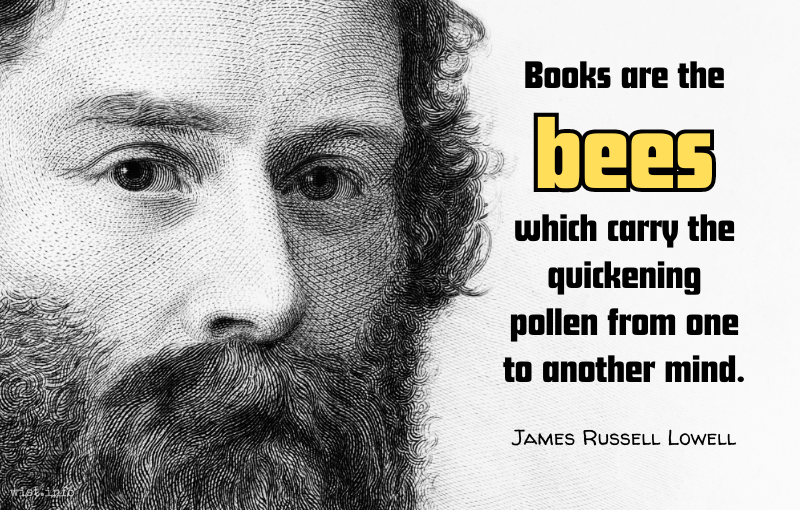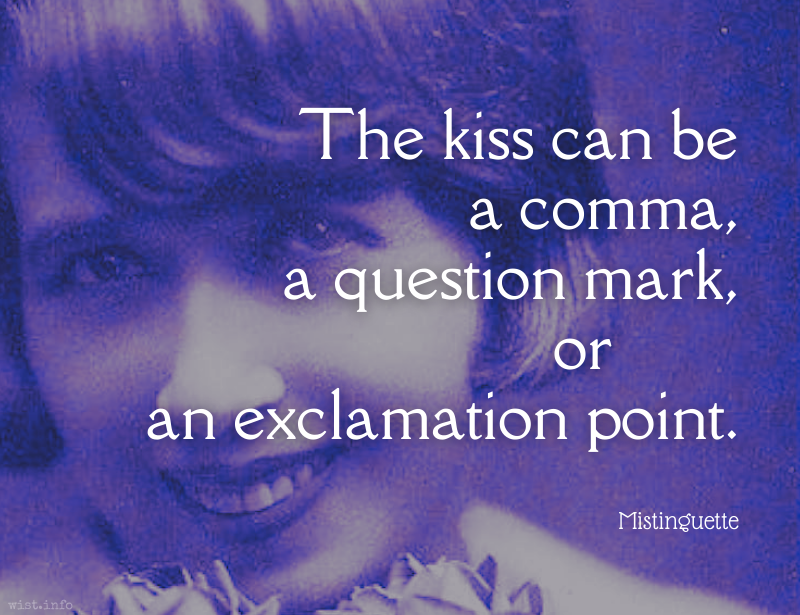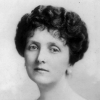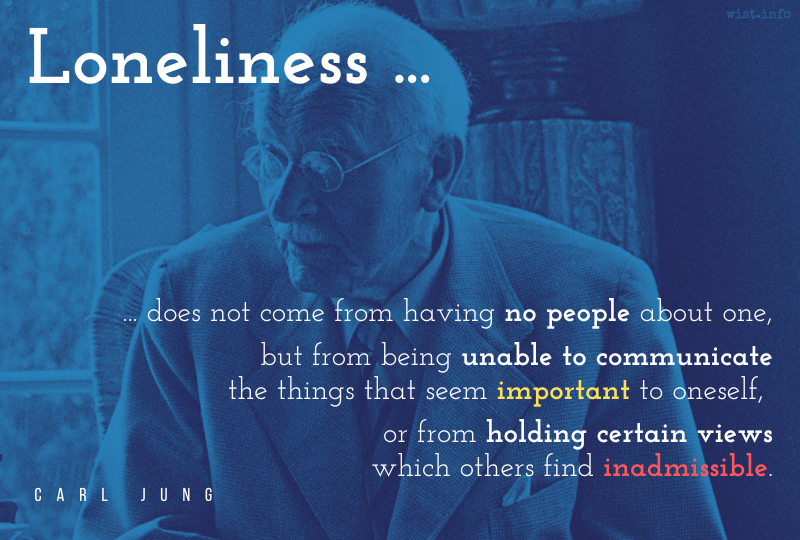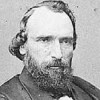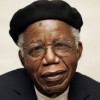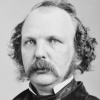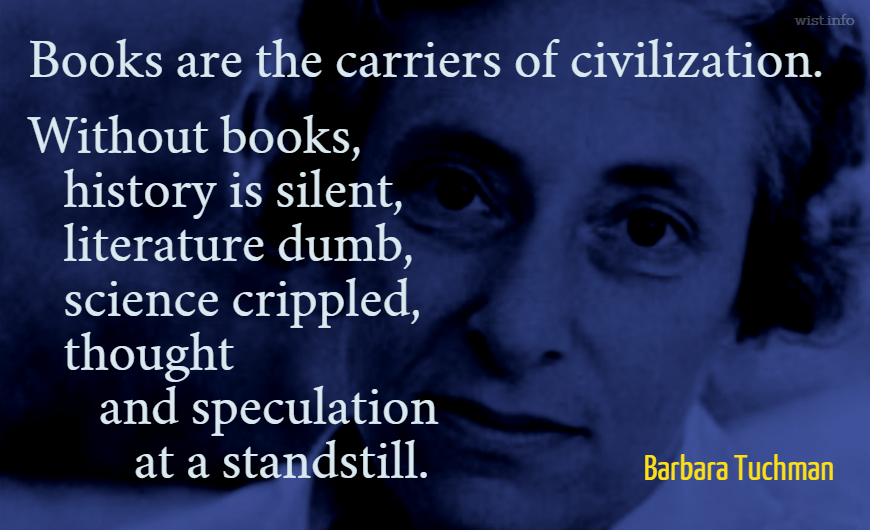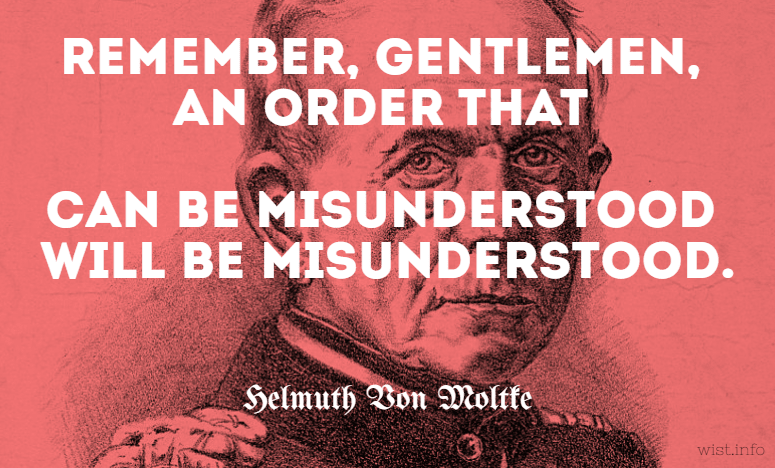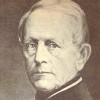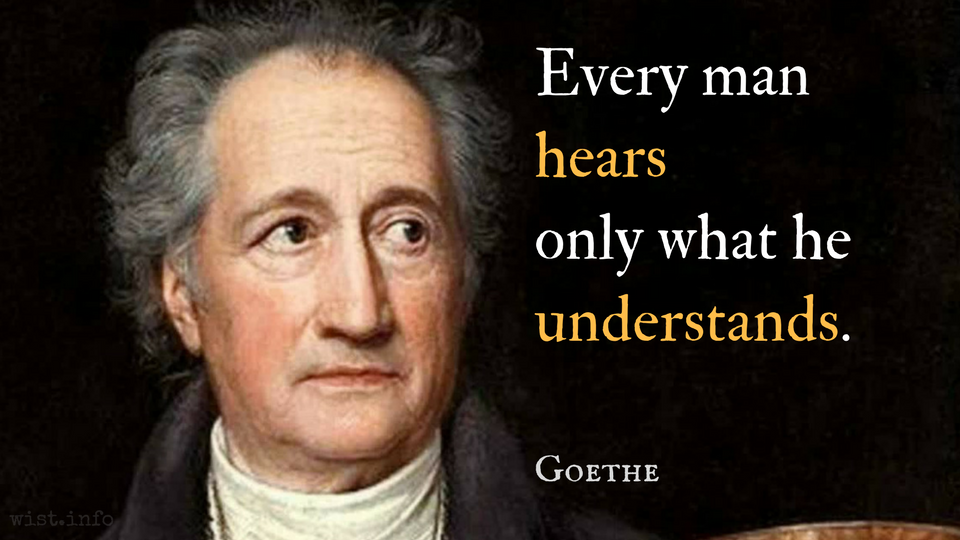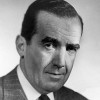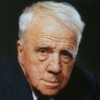Writing is perhaps the greatest of human inventions, binding together people, citizens of distant epochs, who never knew one another. Books break the shackles of time, proof that humans can work magic.
Carl Sagan (1934-1996) American scientist and writer
Cosmos, ch. 11 “The Persistence of Memory” (1980)
(Source)
Quotations about:
communication
Note not all quotations have been tagged, so Search may find additional quotes on this topic.
A book is made from a tree. It is an assemblage of flat, flexible parts (still called “leaves”) imprinted with dark pigmented squiggles. One glance at it and you hear the voice of another person, perhaps someone dead for thousands of years. Across the millennia, the author is speaking, clearly and silently, inside your head, directly to you.
That is not good language which all understand not.
George Herbert (1593-1633) Welsh priest, orator, poet.
Jacula Prudentum, or Outlandish Proverbs, Sentences, &c. (compiler), # 302 (1640 ed.)
(Source)
The idea that people can behave naturally, without resorting to an artificial code tacitly agreed upon by their society, is as silly as the idea that they can communicate by a spoken language without commonly accepted semantic and grammatical rules.
Judith Martin (b. 1938) American author, journalist, etiquette expert [a.k.a. Miss Manners]
Common Courtesy, “On Etiquette as Language, Weapon, Custom, and Craft” (1985)
(Source)
The natural approach to human relations presumes that to know any person well enough is to love him, and that, therefore, the only human problem is a communication problem. It refuses to admit the possibility that people might be separated by basic, deeply held, genuinely irreconcilable differences — philosophical, political, or religious. Thus, the effort to trivialize etiquette as being a barrier to the happy mingling of souls, actually trivializes intellectual, emotional, and spiritual convictions by characterizing any difference between one person’s and another’s as no more than a simple misunderstanding, easily solved by frank exchanges or orchestrated “encounters.”
Judith Martin (b. 1938) American author, journalist, etiquette expert [a.k.a. Miss Manners]
Common Courtesy, “In the Quest for Equality, Civilization Itself Is Maligned” (1985)
(Source)
Originally published in The New Republic in 1984.
Books are the bees which carry the quickening pollen from one to another mind.
James Russell Lowell (1819-1891) American diplomat, essayist, poet
“Nationality in Literature,” North American Review, Article 10 (1849-07)
(Source)
Reviewing Henry Wadsworth Longfellow, Kavanagh (1849).
Like a trained surgeon who is careful where he cuts, parents, too, need to become skilled in the use of words. Because words are like knives. They can inflict, if not physical, many painful emotional wounds.
Haim Ginott (1922-1973) Israeli-American school teacher, child psychologist, psychotherapist [b. Haim Ginzburg]
Between Parent and Child, Introduction (2003 ed.) [with A. Ginott and H. W. Goddard]
(Source)
ANNA: Well, people change, and forget to tell each other. Too bad — causes so many mistakes.
Lillian Hellman (1905-1984) American playwright, screenwriter
Toys in the Attic, Act 3 (1959)
(Source)
Only if a child feels right can he think right.
Haim Ginott (1922-1973) Israeli-American school teacher, child psychologist, psychotherapist [b. Haim Ginzburg]
Teacher and Child, ch. 4 “Congruent Communication” (1972)
(Source)
All ways of expressing ourselves are good if they make us understood. Thus, if the clarity of our thoughts comes through better in a play of words, then the wordplay is good.
Joseph Joubert (1754-1824) French moralist, philosopher, essayist, poet
Pensées [Thoughts], 1805 (1850 ed.) [tr. Auster (1983)]
(Source)
Analog not found in standard translations of the Pensees.
It is a sad thing when men have neither enough intelligence to speak well nor enough sense to hold their tongues.
[C’est une grande misère que de n’avoir pas assez d’esprit pour bien parler, ni assez de jugement pour se taire.]Jean de La Bruyère (1645-1696) French essayist, moralist
The Characters [Les Caractères], ch. 5 “Of Society and Conversation [De la Société et de la Conversation],” § 18 (5.18) (1688) [tr. Van Laun (1885)]
(Source)
(Source (French)). Alternate translations:'Tis a sad thing when Men have neither Wit enough to speak well, nor Sense enough to hold their tongues.
[Bullord ed. (1696)]'Tis a sad thing when Men have neither Wit enough to speak well, nor Judgment enough to hold their Tongues.
[Curll ed. (1713)]It is a sad Thing when Men have neither Wit to speak well, nor Judgment to hold their Tongues.
[Browne ed. (1752)]It is a great misfortune to have neither wit enough to talk well nor sense enough to keep silence.
[tr. Stewart (1970)]
We hear only half of what is said to us, understand only half of that, believe only half of that, and remember only half of that.
Mignon McLaughlin (1913-1983) American journalist and author
The Neurotic’s Notebook, ch. 5 (1963)
(Source)
The art of the parenthesis is one of the great secrets of eloquence in society.
[L’art de la parenthèse est un des grands secrets de l’éloquence dans la Société.]
Nicolas Chamfort (1741-1794) French writer, epigrammist (b. Nicolas-Sébastien Roch)
Products of Perfected Civilization [Produits de la Civilisation Perfectionée], Part 1 “Maxims and Thoughts [Maximes et Pensées],” ch. 3, ¶ 243 (1795) [tr. Sinicalchi]
(Source)
(Source (French)). Alternate translations:The art of the parenthesis is one of the great secrets of social eloquence.
[tr. Mathers (1926)]The art of parenthesis is one of the great secrets of eloquence in society.
[tr. Merwin (1969)]
Ideal conversation must be an exchange of thought, and not, as many of those who worry most about their shortcomings believe, an eloquent exhibition of wit or oratory.
Emily Post (1872-1960) American author, columnist [née Price]
Etiquette: The Blue Book of Social Usage, ch. 6 “The Art of Conversation” (1922; 1955 10th ed.)
(Source)
We hear only half of what is said to us, understand only half of that, believe only half of that, and remember only half of that.
Mignon McLaughlin (1913-1983) American journalist and author
The Neurotic’s Notebook, ch. 5 (1963)
(Source)
Argument and flattery are but poor elements out of which to form a conversation.
[Widerspruch und Schmeichelei machen beide ein schlechtes Gespräch.]
Johann Wolfgang von Goethe (1749-1832) German poet, statesman, scientist
Elective Affinities [Die Wahlverwandtschaften], Part 2, ch. 4, “From Ottilie’s Journal [Aus Ottiliens Tagebuche]” (1809) [Niles ed. (1872)]
(Source)
(Source (German)). Alternate translation:Contradiction and flattery both make bad conversation.
[tr. Hollingdale (1971)]
Evil communication corrupts good manners. I hope to live to hear that good communication corrects “bad manners.”
Benjamin Banneker (1731-1806) American naturalist, surveyor, almanac author, mathematician
Handwritten note in one of his almanacs
(Source)
Quoted in Friends' Intelligencer, vol. 11 (1854).
Precision of communication is important, more important than ever, in our era of hair-trigger balances, when a false, or misunderstood word may create as much disaster as a sudden thoughtless act.
Composition is a discipline; it forces us to think. If you want to “get in touch with your feelings,” fine — talk to yourself, we all do. But if you want to communicate with another thinking human being, get in touch with your thoughts. Put them in order; give them a purpose; use them to persuade, to instruct, to discover, to seduce.
William Safire (1929-2009) American author, columnist, journalist, speechwriter
Commencement Address, Syracuse University (13 May 1978)
(Source)
Reprinted in On Language, "Commencement Address" (1980).
No pleasure has any taste for me when not shared with another: no happy thought occurs to me without my being irritated at bringing it forth alone with no one to offer it to.
[Nul plaisir n’a saveur pour moy sans communication. Il ne me vient pas seulement une gaillarde pensée en l’ame, qu’il ne me fasche de l’avoir produite seul, et n’ayant à qui l’offrir.]
Michel de Montaigne (1533-1592) French essayist
Essays, Book 3, ch. 9 “Of Vanity [De la vanité]” (c. 1587) (3.9) (1595) [tr. Screech (1987)]
(Source)
First appeared in the 1588 edition.
(Source (French)). Alternate translations:With me no pleasure is fully delightsome without communication and no delight absolute except imparted. I doe not so much as apprehend one rare conceipt, or conceive one excellent good thought in my minde, but me thinks I am much grieved and grievously perplexed to have produced the same alone and that I have no sympathizing companion to impart it unto.
[tr. Florio (1603)]There can be no Pleasure to me without Communication. There is not so much as a spritely Thought comes into my Mind, that it does not grieve me to have produc'd alone, and that I have no one to communicate it unto.
[tr. Cotton (1686)]There can be no pleasure to me without communication: there is not so much as a sprightly thought comes into my mind, that it does not grieve me to have produced alone, and that I have no one to communicate it to.
[tr. Cotton/Hazlitt (1877)]No pleasure has any savour for me without imparting it; not even a lively thought comes into my mind that I am not vexed at expressing it when alone and at having no one to offer it to.
[tr. Ives (1925)]No pleasure has any savor for me without communication. Not even a merry thought comes to my mind without my being vexed at having produced it alone without anyone to offer it to.
[tr. Frame (1943)]
Each one of us is alone in the world. He is shut in a tower of brass, and can communicate with his fellows only by signs, and the signs have no common value, so that their sense is vague and uncertain. We seek pitifully to convey to others the treasures of our heart, but they have not the power to accept them, and so we go lonely, side by side but not together, unable to know our fellows and unknown by them. We are like people living in a country whose language they know so little that, with all manner of beautiful and profound things to say, they are condemned to the banalities of the conversation manual. Their brain is seething with ideas, and they can only tell you that the umbrella of the gardener’s aunt is in the house.
W. Somerset Maugham (1874-1965) English novelist and playwright [William Somerset Maugham]
The Moon and Sixpence, ch. 42 (1919)
(Source)
What we’ve got here is a failure to communicate.
Donn Pearce (1928-2017) American novelist, screenwriter
Cool Hand Luke (1967) [with Frank Pierson]
(Source)
The line actually occurs twice in the movie. It's initially voiced by the Captain, the warden of the prison where Luke is sent to. While the line shows up in the final revision of the script (sc. 313) as above, Strother Martin actually speaks it in the movie without the indefinite article "a" before "failure":
What we’ve got here is failure to communicate.
The second time the line shows up -- spoken by Luke, at the end of the movie, mocking the Captain -- it is both scripted (sc. 432) and filmed with the article intact.
Speaking of love, one problem that recurs more and more frequently these days, in books and plays and movies, is the inability of people to communicate with the people they love: husbands and wives who can’t communicate, children who can’t communicate with their parents, and so on. And the characters in these books and plays and so on, and in real life, I might add, spend hours bemoaning the fact that they can’t communicate. I feel that if a person can’t communicate, the very least he can do is to shut up.
Tom Lehrer (b. 1928) American mathematician, satirist, songwriter
“Alma,” Afterword, That Was the Year That Was (1965)
(Source)
Rumor! What evil can surpass her speed?
In movement she grows mighty, and achieves
strength and dominion as she swifter flies.
small first, because afraid, she soon exalts
her stature skyward, stalking through the lands
and mantling in the clouds her baleful brow.[Fama, malum qua non aliud velocius ullum;
Mobilitate viget, virisque adquirit eundo;
Parva metu primo; mox sese attollit in auras,
Ingrediturque solo, et caput inter nubila condit.]Virgil (70-19 BC) Roman poet [b. Publius Vergilius Maro; also Vergil]
The Aeneid [Ænē̆is], Book 4, l. 174ff (4.174-177) (29-19 BC) [tr. Williams (1910)]
(Source)
(Source (Latin)). Alternate translations:Fame is an evill, none more swift, which gaines
By motion strength, in flying force obtaines,
Small first by feare, to heaven advanc'd now shrowds,
Stalking on earth, her head amongst the clouds.
[tr. Ogilby (1649)]Fame, the great ill, from small beginnings grows:
Swift from the first; and ev'ry moment brings
New vigor to her flights, new pinions to her wings.
Soon grows the pigmy to gigantic size;
Her feet on earth, her forehead in the skies.
[tr. Dryden (1697)]Fame, than whom no pest is more swift, by exerting her agility grows more active, and acquires strength on her way : small at first through fear; soon she shoots up into the skies, and stalks along the ground, while she hides her head among the clouds.
[tr. Davidson/Buckley (1854)]Fame than who never plague that runs
Its way more swiftly wins:
Her very motion lends her power:
She flies and waxes every hour.
At first she shrinks, and cowers for dread:
Ere long she soars on high:
Upon the ground she plants her tread,
Her forehead in the sky.
[tr. Conington (1866)]Rumor, than whom no evil is more swift.
She grows by motion, gathers strength by flight.
Small at the first, through fear, soon to the skies
She lifts herself. She walks upon the ground.
And hides her head in clouds.
[tr. Cranch (1872)]Rumour, than whom none other is more swift to mischief; she thrives on restlessness and gains strength by going: at first small and timorous; soon she lifts herself on high and paces the ground with head hidden among the clouds.
[tr. Mackail (1885)]Rumour, of whom nought swifter is of any evil thing:
She gathereth strength by going on, and bloometh shifting oft!
A little thing, afraid at first, she springeth soon aloft;
Her feet are on the worldly soil, her head the clouds o'erlay.
[tr. Morris (1900)]Fame, far the swiftest of all mischiefs bred;
Speed gives her force; she strengthens as she flies.
Small first through fear, she lifts a loftier head,
Her forehead in the clouds, on earth her tread.
[tr. Taylor (1907), st. 23, ll. 200-204]Rumour of all evils the most swift. Speed lends her strength, and she wins vigour as she goes; small at first through fear, soon she mounts up to heaven, and walks the ground with head hidden in the clouds.
[tr. Fairclough (1916)]Rumor
Than whom no other evil was ever swifter.
She thrives on motion and her own momentum;
Tiny at first in fear, she swells, colossal
In no time, walks on earth, but her head is hidden
Among the clouds.
[tr. Humphries (1951)]Rumour, the swiftest traveller of all the ills on earth,
Thriving on movement, gathering strength as it goes; at the start
A small and cowardly thing, it soon puffs itself up,
And walking upon the ground, buries its head in the cloud-base.
[tr. Day Lewis (1952)]Rumor,
whose life is speed, whose going gives her force.
Timid and small at first, she soon lifts up
her body in the air. She stalks the ground;
her head is hidden in the clouds.
[tr. Mandelbaum (1971), l. 230ff]Rumor
Thrives on motion, stronger for the running,
Lowly at first through fear, then rearing high,
She treads the land and hides her head in cloud.
[tr. Fitzgerald (1981), l. 241ff]Of all the ills there are, Rumour is the swiftest. She thrives on movement and gathers strength as she goes. From small and timorous beginnings she soon lifts herself up into the air, her feet still on the ground and her head hidden in the clouds.
[tr. West (1990)]Rumour, compared with whom no other is as swift.
She flourishes by speed, and gains strength as she goes:
first limited by fear, she soon reaches into the sky,
walks on the ground, and hides her head in the clouds.
[tr. Kline (2002)]Rumor, the swiftest of evils. She thrives on speed
And gains power as she goes. Small and timid at first,
She grows quickly, and though her feet touch the ground
Her head is hidden in the clouds.
[tr. Lombardo (2005), l. 199ff]Rumor, swiftest of all the evils in the world.
She thrives on speed, stronger for every stride,
slight with fear at first, soon soaring into the air
she treads the ground and hides her head in the clouds.
[tr. Fagles (2006), l. 220ff]Rumor, no other evil can move more quickly:
She grows with speed and acquires strength in motion,
At first, she is small from fear, but soon she raises herself to the sky
and walks onto the land hiding her head among the clouds.
[tr. @sentantiq (2015)]Rumor, swiftest of all evil;
she thrives on speed and gains strength as she goes.
At first she's small and scared, but soon she rears to the skies,
her feet still on the ground, her head hidden in the clouds.
[tr. Bartsch (2021)]
We are all so clumsy, my dear, and words are all we have, poor signals like bonfires and flags trying to express what shipwreck is.
Rose Wilder Lane (1886-1968) American journalist, travel writer, novelist, political theorist
Letter to Dorothy Thompson (Jan 1927)
(Source)
In William Holtz, ed., Dorothy Thompson and Rose Wilder Lane: Forty Years of Friendship (1991)
Loneliness does not come from having no people about one, but from being unable to communicate the things that seem important to oneself, or from holding certain views which others find inadmissible.
Carl Jung (1875-1961) Swiss psychologist
Memories, Dreams, Reflections [Erinnerungen, Träume, Gedanken], “Retrospect” (1962) [with Aniela Jaffé; tr. Winston (1963)]
(Source)
To be misunderstood even by those whom one loves is the cross and bitterness of life.
Henri-Frédéric Amiel (1821-1881) Swiss philosopher, poet, critic
Journal Intime (1849-05-27) [tr. Ward (1885)]
(Source)
Politeness, however, acts the lady’s-maid to our thoughts; and they are washed, dressed, curled, rouged, and perfumed, before they are presented to the public.
Letitia Elizabeth Landon (1802-1838) English poet and novelist [a/k/a L.E.L.]
Romance and Reality, Vol. 2, ch. 14 (1831)
(Source)
Nobody really listens to anyone else, and if you try it for a while you’ll see why.
Mignon McLaughlin (1913-1983) American journalist and author
The Second Neurotic’s Notebook, ch. 3 (1966)
(Source)
It’s very important to decode your own messages, like saying “I feel angry” instead of kicking the cat, and people who learn to do this find they are misunderstood less often and, as a fringe benefit, are clawed by fewer cats.
Drink, the social glue of the human race. Probably in the beginning we could explain ourselves to our close family members with grunts, muttered syllables, gestures, slaps, and punches. Then when the neighbors started dropping in to help harvest, stomp, stir, and drink the bounty of the land, after we’d softened our natural suspicious hostility with a few stiff ones, we had to think up some more nuanced communications, like words. From there it was a short step to grammar, civil law, religion, history, and “The Whiffenpoof Song.”
Clarity of language is the first casualty of authoritarianism.
Robin Morgan (b. 1941) American poet, author, activist, journalist
“Saving the World,” Ms. (Summer 2003)
(Source)
Kindness is a language the dumb can speak and the deaf can hear and understand.
Christian Nestell Bovee (1820-1904) American epigrammatist, writer, publisher
Thoughts, Feelings, & Fancies (1857)
Slightly revised in Bovee's Intuitions & Summaries of Thought (1862): "Kindness: a language which the dumb can speak, and the deaf can understand."
Since the 2000s, frequently misattributed to Mark Twain. More information: The Apocryphal Twain: "Kindness is language the deaf can hear." - Center for Mark Twain Studies.
I have always been among those who believed that the greatest freedom of speech was the greatest safety, because if a man is a fool, the best thing to do is to encourage him to advertise the fact by speaking. It cannot be so easily discovered if you allow him to remain silent and look wise, but if you let him speak, the secret is out, and the world knows that he is a fool. So it is by the exposure of folly that it is defeated, not by the seclusion of folly, and, in this free air of free speech, men get into that sort of communication with one another which constitutes the basis of all common achievement.
Woodrow Wilson (1856-1924) US President (1913-20), educator, political scientist
Speech, Institute of France, Paris (10 May 1919)
(Source)
Perhaps the safest thing to do at the outset, if technology permits, is to send music. This language may be the best we have for explaining what we are like to others in space, with least ambiguity. I would vote for Bach, all of Bach, streamed out into space, over and over again. We would be bragging of course, but surely it is excusable for us to put the best possible face on at the beginning of such an acquaintance. We can tell the harder truths later.
Lewis Thomas (1913-1993) American physician, poet, essayist, researcher
“Ceti,” New England Journal of Medicine (10 Feb 1972)
(Source)
On sending messages to extraterrestrial civilizations on other worlds, e.g. Tau Ceti. Citation N Engl J Med 1972; 286:306-307. Reprinted in The Lives of a Cell: Notes of a Biology Watcher (1974).
This communicating of a man’s self to his friend worketh two contrary effects; for it redoubleth joys and cutteth griefs in Halves. For there is no man that imparteth his joys to his friend, but he joyeth the more; and no man that imparteth his griefs to his friend, but that he grieveth the less.
Francis Bacon (1561-1626) English philosopher, scientist, author, statesman
“Of Friendship,” Essays, No. 27 (1625)
(Source)
I made up my mind long ago to follow one cardinal rule in all my writing — to be clear. I have given up all thought of writing poetically or symbolically or experimentally, or in any of the other modes that might (if I were good enough) get me a Pulitzer prize. I would write merely clearly and in this way establish a warm relationship between myself and my readers, and the professional critics — Well, they can do whatever they wish.
Isaac Asimov (1920-1992) Russian-American author, polymath, biochemist
Nemesis, “Author’s Note” (1989)
(Source)
For indeed it is possible that a man may think well, and yet not be able to express his thoughts elegantly; but for any one to publish thoughts which he can neither arrange skilfully nor illustrate so as to entertain his reader, is an unpardonable abuse of letters and retirement: they, therefore, read their books to one another, and no one ever takes them up but those who wish to have the same licence for careless writing allowed to themselves.
[Fieri autem potest, ut recte quis sentiat et id quod sentit polite eloqui non possit; sed mandare quemquam litteris cogitationes suas, qui eas nec disponere nec inlustrare possit nec delectatione aliqua allicere lectorem, hominis est intemperanter abutentis et otio et litteris. Itaque suos libros ipsi legunt cum suis, nec quisquam attingit praeter eos, qui eandem licentiam scribendi sibi permitti volunt.]
Marcus Tullius Cicero (106-43 BC) Roman orator, statesman, philosopher
Tusculan Disputations [Tusculanae Disputationes], Book 1, ch. 3 (1.3) / sec. 6 (45 BC) [tr. Yonge (1853)]
(Source)
Source (Latin). Alternate translations:Now it is possible, that one may have true Conceptions, and yet not be able to express his Notions in proper Terms; but for a man to commit his thoughts to writing for the publick, who can neither put them in due method, nor illustrate them with clear Proofs, nor by any delightful Ornaments entertain his Reader, is the part of one that at no rate abuses his own time, and the benefit of Writing. Here∣upon they read their own Books among themselves, nor doth any one else meddle with them, but they that expect allowance to write after the same loose fashion.
[tr. Wase (1643)]For indeed it may be that a man may think well, and yet not be able to express his thoughts elegant; but for any one ot publish thoughts which eh can neither methodize, nor illustrate nor entertain his reader, is an unpardonable abuse of letters and retirement: they, therefore, read their books to one another, which were never taken up by any but those who claimed the same privilege of writing.
[tr. Main (1824)]For it may very well happen, that a man may think rightly, and yet be unable to give utterance to his sentiments with sufficient elegance. But, for any one to consign his thoughts to letters, who can neither arrange them with method, nor make them intelligible by illustration, nor attract the reader with any delight, is the part of a man who rashly abuses both his leisure and literature. And, therefore, let them read their books themselves with their friends; nor let them be touched by any, except by those who are like to need the same indulgence for the same license in writing.
[tr. Otis (1839)]One may think correctly, yet be unable to give elegant expression to what he thinks; and in that case for a man to commit his thoughts to writing when he can neither arrange them, nor illustrate them, nor attract readers by anything that can give them delight, is the part of a man who outrageously abuses both leisure and letters. Such writers read their own books with their intimate friends, nor does any one else touch them except those who crave for themselves like liberty of writing.
[tr. Peabody (1886)]Even when they have their arguments in order, they don't express them with any flair. They waste their free time -- and do a discredit to literature -- when they commit thoughts to writing without knowing how to arrange or enliven them or give any pleasure to the reader. And so they just end up reading each other's books! No one pays attention to them except people who hope to qualify for the same writer's licence.
[tr. Habinek (1996)]But it can happen that someone may have a good thought which he cannot express well.
[tr. @sentantiq (2016)]It is possible for a man to hold the right views but be incapable of expressing these with any elegance; but that anyone should entrust his thoughts to writing, without the ability to arrange them or to express them with clarity, or to attract the reader by offering him some pleasure, is characteristic of a man who is making an ill-disciplined misuse of both leisure and writing. The result is these fellows read their own books to their own circle and no one touches them except those who wish to be permitted the same freedom in writing.
[tr. Davie (2017)]
Good conversation can leave you more exhilarated than alcohol; more refreshed than the theater or a concert. It can bring you entertainment and pleasure; it can help you get ahead, solve problems, spark the imagination of others. It can increase your knowledge and education. It can erase misunderstandings, and bring you closer to those you love.
Dorothy Sarnoff (1914-2008) American opera singer, actress, image consultant
Speech Can Change Your Life (1971)
(Source)
Now and in the time to be, I think it will pay for you to zero in on being precise with your language. Try to build and treat your vocabulary the way you are to treat your checking account. Pay every attention to it and try to increase your earnings. The purpose here is not to boost your bedroom eloquence or your professional success — although those, too, can be consequences — nor is it to turn you into parlor sophisticates. The purpose is to enable you to articulate yourselves as fully and precisely as possible; in a word, the purpose is your balance.
Joseph Brodsky (1940-1996) Russian-American poet, essayist, Nobel laureate, US Poet Laureate [Iosif Aleksandrovič Brodskij]
“Speech at the Stadium,” Commencement Address, University of Michigan (18 Dec 1988)
(Source)
There is no such thing as conversation. It is an illusion. There are intersecting monologues, that is all. We speak; we spread round us with sounds, with words, an emanation from ourselves. Sometimes they overlap the circles that others are spreading round themselves. Then they are affected by these other circles, to be sure, but not because of any real communication that has taken place — merely as a scarf of blue chiffon lying on a woman’s dressing table will change color if she casts down on it a scarf of red chiffon.
Rebecca West (1892-1983) British author, journalist, literary critic, travel writer [pseud. for Cicily Isabel Fairfield]
“There Is No Conversation,” The Saturday Evening Post (1928-12-08)
(Source)
In the initial magazine appearance, the third sentence read, "There are interesting monologues." When reprinted in The Harsh Voice: Four Short Novels (1935), and subsequently, interesting was replaced with intersecting.
More discussion about this quotation: There Is No Such Thing as Conversation. It Is an Illusion. There Are Intersecting Monologues, That Is All – Quote Investigator®.
Broadly speaking, short words are best, and the old words, when short, are the best of all.
Winston Churchill (1874-1965) British statesman and author
The Times Literary Award luncheon, London (2 Nov 1949)
(Source)
Of all the ridiculous expressions people use — and people use a great many ridiculous expressions — one of the most ridiculous is “No news is good news.” “No news is good news” simply means that if you don’t hear from someone, everything is probably fine, and you can see at once why this expression makes such little sense because everything being fine is only one of many, many reasons why someone may not contact you. Perhaps they are tied up. Maybe they are surrounded by fierce weasels, or perhaps they are wedged tightly between two refrigerators and cannot get themselves out. The expression might as well be changed to “no news is bad news,” except that people may not be able to contact you because they have just been crowned king or are competing in a gymnastics tournament. The point is that there is no way to know why someone has not contacted you until they contact you and explain themselves. For this reason, the sensible expression would be “no news is no news,” except that it is so obvious that it is hardly an expression at all.
Language is civilization itself. The Word, even the most contradictory word, binds us together. Wordlessness isolates.
Thomas Mann (1875-1955) German writer, critic, philanthropist, Nobel laureate [Paul Thomas Mann]
The Magic Mountain [Der Zauberberg], Part 6, “A Good Soldier” (1924) [tr. Woods]
(Source)
Alt. trans.: "Speech is civilization itself. The word, even the most contradictory word, preserves contact -- it is silence which isolates." [tr. Lowe-Porter]
There is that great proverb — that until the lions have their own historians, the history of the hunt will always glorify the hunter.
Chinua Achebe (1930-2013) Nigerian novelist, poet, professor, critic [Albert Chinualumogu Achebe]
Interview by Jerome Brooks, “The Art of Fiction,” #139, The Paris Review (Winter 1994)
(Source)
Referring to an African proverb, usually rendered, "Until the lion learns to write, every story will glorify the hunter."
Marriage is nine-tenths talk.
H. L. Mencken (1880-1956) American writer and journalist [Henry Lewis Mencken]
Diary (1945-05-30)
(Source)
I do so wish sometimes, that I could just pop home for an hour or two as easily in the flesh as in the spirit. No doubt the explorers of 2015, if there is anything left to explore, will not only carry their pocket wireless telephones fitted with wireless telescopes but will also receive their nourishment and warmth by wireless means & also their power to drive their motor sledges, but, of course, there will be an aerial daily excursion to both Poles then & it will be the bottom of the Atlantic, if not the centre of the earth, that will form the goal in those days.
Thomas Orde-Lees (1877-1948) British naval officer, arctic explorer, mountaineer, writer
Diary, aboard HMS Endurance (1915-01-10)
Written while the ship was trapped in the ice during Ernest Shackleton's ill-fated Imperial Trans-Antarctic Expedition. Some versions of the quotation refer to "2012," rather than 2015.
While the reference to "pocket wireless telephones" makes this quotation suspect, Orde-Lees has extensive diary material published, and this appears to be genuine.
The influence exercised over the human mind by apt analogies is and has always been immense. Whether they translate an established truth into simple language or whether they adventurously aspire to reveal the unknown, they are among the most formidable weapons of the rhetorician.
Winston Churchill (1874-1965) British statesman and author
“The Scaffolding of Rhetoric” (Nov 1897)
(Source)
Commonly abridged, "Apt analogies are among the most formidable weapons of the rhetorician."
And so these men of Indostan
Disputed loud and long,
Each in his own opinion
Exceeding stiff and strong.
Though each was partly in the right
And all were in the wrong!So oft in theologic wars,
The disputants, I ween,
Rail on in utter ignorance
Of what each other mean,
And prate about an Elephant
Not one of them has seen!John Godfrey Saxe (1816-1887) American poet and satirist
“The Blind Men and the Elephant,” st. 8 and “Moral” (c. 1861; publ. 1872)
(Source)
Saxe introduced the parable, which dates back to India (c. 500 BC) to American audiences. He wrote the poem originally against what he felt was extremism on both sides that led the the American Civil War.
An intellectual is a man who says a simple thing in a difficult way; an artist is a man who says a difficult thing in a simple way.
I really love language; it allows us to explain the pain and the glory, the nuances and the delicacies, of our existence. Most of all, it allows us to laugh. We need language.
Books are the carriers of civilization. Without books, history is silent, literature dumb, science crippled, thought and speculation at a standstill.
Barbara W. Tuchman (1912-1989) American historian and author
Essay (1979-12-30), “Papyrus to Paperbacks: The World That Books Made,” Washington Post
(Source)
A scrupulous writer, in every sentence that he writes, will ask himself at least four questions, thus: What am I trying to say? What words will express it? What image or idiom will make it clearer? Is this image fresh enough to have an effect? And he will probably ask himself two more: Could I put it more shortly? Have I said anything that is avoidably ugly?
But you are not obliged to go to all this trouble. You can shirk it by simply throwing your mind open and letting the ready-made phrases come crowding in. They will construct your sentences for you — even think your thoughts for you, to a certain extent — and at need they will perform the important service of partially concealing your meaning even from yourself.
It is at this point that the special connection between politics and the debasement of language becomes clear.George Orwell (1903-1950) English writer [pseud. of Eric Arthur Blair]
Essay (1946-04), “Politics and the English Language,” Horizon Magazine
(Source)
One can often be in doubt about the effect of a word or a phrase, and one needs rules that one can rely on when instinct fails. I think the following rules will cover most cases:
- Never use a metaphor, simile, or other figure of speech which you are used to seeing in print.
- Never use a long word where a short one will do.
- If it is possible to cut a word out, always cut it out.
- Never use the passive where you can use the active.
- Never use a foreign phrase, a scientific word, or a jargon word if you can think of an everyday English equivalent.
- Break any of these rules sooner than say anything outright barbarous.
George Orwell (1903-1950) English writer [pseud. of Eric Arthur Blair]
Essay (1946-04), “Politics and the English Language,” Horizon Magazine
(Source)
Writing advice for "expressing and not for concealing or preventing thought."
It is chiefly through books that we enjoy intercourse with superior minds, and these invaluable means of communication are in the reach of all. In the best books, great men talk to us, give us their most precious thoughts, and pour their souls into ours.
KEATING: Now, language was developed for one endeavor, and that is? Mr. Anderson? Come on! Are you a man or an amoeba? Mr. Perry?
NEIL: Uh, to communicate.
KEATING: No! To woo women!
DESDEMONA: Upon my knees, what doth your speech import?
I understand a fury in your words,
But not the words.William Shakespeare (1564-1616) English dramatist and poet
Othello, Act 4, sc. 2, l. 37ff (4.2.37-39) (1603)
(Source)
TROUT: I personally think we
developed language because of our deep inner need
to complain.Jane Wagner (b. 1935) American humorist, writer, director
The Search for Signs of Intelligent Life in the Universe, Part 2 (1985) [perf. Lily Tomlin]
(Source)
Variant: "Man invented language to satisfy his deep need to complain."
Loneliness is never more cruel than when it is felt in close propinquity with someone who has ceased to communicate.
Germaine Greer (b. 1939) Australian-English feminist, reformer, author, educator
The Female Eunuch, “Love: Security” (1970)
(Source)
The problem with communication is the illusion that it has occurred.
George Bernard Shaw (1856-1950) British playwright and critic
(Spurious)
Frequently attributed, but not found in Shaw's writings. Most likely originated by William Hollingsworth Whyte, "Is Anybody Listening?" Fortune (Sep 1950). More discussion: The Biggest Problem in Communication Is the Illusion That It Has Taken Place – Quote Investigator.
Eloquence is the power to translate a truth into language perfectly intelligible to the person to whom you speak.
Ralph Waldo Emerson (1803-1882) American essayist, lecturer, poet
Lecture (1867), “Eloquence,” Chicago
(Source)
Collected in Letters and Social Aims (1876).
The speed of communications is wondrous to behold. It is also true that speed can multiply the distribution of information that we know to be untrue. The most sophisticated satellite has no conscience. The newest computer can merely compound, at speed, the oldest problem in the relations between human beings and in the end the communicator will be confronted with the old problem of what to say and how to say it.
Edward R. Murrow (1908-1965) American journalist
Speech, The Family of Man Award, The Protestant Council of New York (Oct 1964)
(Source)
His last public speech. Reprinted in Alexander Kendrick, Prime Time: The Life of Edward R. Murrow (1969).
No tears in the writer, no tears in the reader. No surprise for the writer, no surprise for the reader.
Robert Frost (1874-1963) American poet
“The Figure a Poem Makes,” Collected Poems, Preface, “The Figure a Poem Makes” (1939)
(Source)
Don’t write anything you can phone. Don’t phone anything you can talk. Don’t talk anything you can whisper. Don’t whisper anything you can smile. Don’t smile anything you can nod. Don’t nod anything you can wink.
Earl Kemp Long (1895-1960) American politician, orator.
(Attributed)
Advice on political discretion. Widely attributed, but with no primary sourcing or particular context I can find. Quoted in his biography, Michael L. Kurtz, Earl K. Long: The Saga of Uncle Earl and Louisiana Politics, ch. 7 (1990).
The great enemy of clear language is insincerity. When there is a gap between one’s real and one’s declared aims, one turns as it were instinctively to long words and exhausted idioms, like a cuttlefish spurting out ink.
George Orwell (1903-1950) English writer [pseud. of Eric Arthur Blair]
Essay (1946-04), “Politics and the English Language,” Horizon Magazine
(Source)
If I speak in the tongues of humans and of angels but do not have love, I am a noisy gong or a clanging cymbal.
The Bible (The New Testament) (AD 1st - 2nd C) Christian sacred scripture
1 Corinthians 13:1 [NRSV (2021 ed.)]
(Source)
Alternate translations:Though I speak with the tongues of men and of angels, and have not charity, I am become as sounding brass, or a tinkling cymbal.
[KJV (1611)]If I have all the eloquence of men or of angels, but speak without love, I am simply a gong booming or a cymbal clashing.
[JB (1966)]I may be able to speak the languages of human beings and even of angels, but if I have no love, my speech is no more than a noisy gong or a clanging bell.
[GNT (1976)]Though I command languages both human and angelic -- if I speak without love, I am no more than a gong booming or a cymbal clashing.
[NJB (1985)]If I speak in tongues of human beings and of angels but I don’t have love, I’m a clanging gong or a clashing cymbal.
[CEB (2011)]
Let us make a special effort to learn to stop communicating with each other, so that we can have some conversation.
Judith Martin (b. 1938) American author, journalist, etiquette expert [a.k.a. Miss Manners]
“Miss Manners,” syndicated column (1979-09-01)
Reprinted in Miss Manners' Guide to Excruciatingly Correct Behavior, Part 3 "Basic Civilization," "Social Intercourse" (1983).
Sometimes misattributed to Mark Twain. Often paraphrased (e.g., "Let us make a special effort to stop communicating with each other, so we can have some conversation").
More discussion of this quotation: Let Us Make a Special Effort to Stop Communicating with Each Other, So We Can Have Some Conversation – Quote Investigator®
Blessed is the man who, having nothing to say, abstains from giving us wordy evidence of the fact.
George Eliot (1819-1880) English novelist [pseud. of Mary Ann Evans]
The Impressions of Theophrastus Such, ch. 4 (1879)
(Source)
How many a debate could have been deflated into a single paragraph if the disputants had dared to define their terms?
William James (Will) Durant (1885-1981) American historian, teacher, philosopher
The Story of Philosophy, ch. 2 “Aristotle and Greek Science,” sec. 3 “The Foundation of Logic” (1926)
(Source)
This quotation is frequently misattributed (without citation) to Aristotle (sometimes using "dispute" instead of "debate"), but none of the sources pre-date this passage by Durant. Durant is speaking of Aristotle's development of logic, and his focus on definitions, but the full passage in context is clearly not a quotation:There was a hint of this new science in Socrates’ maddening insistence on definitions, and in Plato’s constant refining of every concept. Aristotle’s little treatise on Definitions shows how his logic found nourishment at this source. “If you wish to converse with me,” said Voltaire, “define your terms.” How many a debate would have been deflated into a paragraph if the disputants had dared to define their terms! This is the alpha and omega of logic, the heart and soul of it, that every important term in serious discourse shall be subjected to strictest scrutiny and definition. It is difficult, and ruthlessly tests the mind; but once done it is half of any task.
Good communication is stimulating as black coffee, and just as hard to sleep after.
Anne Morrow Lindbergh (1906-2001) American writer, pilot
Gift From the Sea, ch. 6 “Argonauta” (1955)
(Source)
Often misquoted as "is as stimulating" or "is just as stimulating as."




